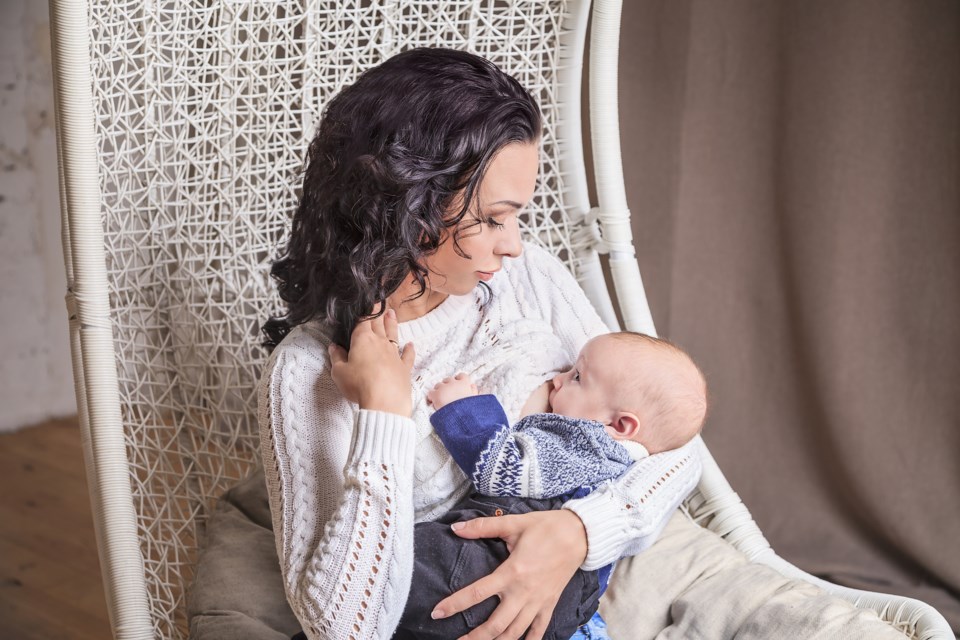The importance of breastfeeding was highlighted by public health agencies around the world this past week as well as by Public Health Sudbury and Districts (PHSD), despite the worries people might have about the COVID-19 pandemic. This is World Breastfeeding Awareness Week.
Dr. Theresa Tam, Canada's Chief Public Health Officer said this week that regardless of the concerns over COVID-19, it is still more important for mothers to breastfeed their babies.
"At the outset of the pandemic, we knew very little about the virus and how it would spread and impact pregnant women and their newborn babies," Tam said. "We are still learning about how COVID-19 is spread. At the present time, there is little evidence that the virus is spread from a mother to her infant through breastfeeding, and the benefits of breastfeeding are considered to far outweigh any potential risks."
That position is endorsed by PHSD, said Lorraine Jones R.N. a public health nurse with the Health Promotion Division of PHSD. Jones is also IBCLC qualified which makes her an International Board Certified Lactation Consultant.
Despite the pandemic, Jones said PHSD continued to encourage breastfeeding.
"We have not stopped providing breastfeeding advice," she said. "For a little while it looked a little different for the first six to eight weeks our support was through telephone." She said Skype and email was also used. As restrictions began to ease, the health unit reopened the breastfeeding clinic.
"Within six to eight weeks we were back in our full PPE in the breastfeeding clinic, seeing moms and babies face to face," said Jones.
She added that the telephone support program was a worthwhile thing.
One of the key services offered by PHSD is a liaison between the health unit, the Sudbury hospital (Health Sciences North) and the new mom. Jones said that service has been changed temporarily so that the public health nurse does the consultation by telephone.
"Once that mom goes home, 48 hours after she goes home, and with her consent, she receives a phone call from the nurse. So that would be our first way to contact the mom, find out how they're doing and if they need anything more," Jones explained.
She said if the new mom feels she needs more than support over the telephone, there are breastfeeding clinics that run Monday to Friday from the main PHSD office on Paris Street and in the Val Caron office a couple of days a week.
Jones said she hasn't come across situations where moms were afraid to provide breastfeeding because of the pandemic. She said the only concern was that some mothers were worried about attending the actual clinic "because they didn't want to leave the security of their own home."
She said as the phone campaign worked, it was a welcome thing when the actual in-person clinics were reopened.
"We recognized not everything could be done over the telephone," Jones said. "Some of these moms needed to be seen in the clinic. The telephone support was what we had to do and we made it work as best we could and then as soon as we were able to get back to the clinic those moms that needed to be seen with their babies would come in."
Jones added that while the pandemic does not appear to have become an issue for new moms, there are still procedures in place if things change.
"We have been lucky enough in this community that we had a fairly low rate of transmission and certainly at this point it hasn't been in the population of new moms and babies. There has been a lot of information on the Internet and our website has been very good at providing the most current information regarding breastfeeding and COVID-19. And so it remains that at this time it does not look like COVID has spread through breastfeeding or the breast milk itself.
"Just like Dr. Tam was saying if we've got a mom who is experiencing coughing or sneezing, then we can ask her to wear a non-medical face mask when she is breastfeeding. She should do that whether she is breastfeeding or not because she is going to be in close contact with that baby. Of course if she is experiencing symptoms, she would want to go and be tested to reassure herself."
Jones said if a mom is very unwell with COVID, the protocol would be to use a breast pump and to store the breast milk in a bottle for the baby.
Jones added that any parent with questions or concerns should call the health unit at 705 522-9200, ext. 342 to speak to a nurse.
"We also have a program called Breastfeeding Companion. That would match a mom with one of our volunteer breastfeeding support people," said Jones.
Jones said one of the things that was noticed during the pandemic is that many new moms found themselves alone at home as friends and family members were forced to stay in their own homes. She said many family members might have decided not to visit the mother and new child for fear of spreading the virus.
"The biggest barrier was fear," she said. "Moms were afraid to go out. Some of them were afraid to come to the clinic. While they had questions and concerns about breastfeeding, that was all rolled up into the ball of this fear of the pandemic."
